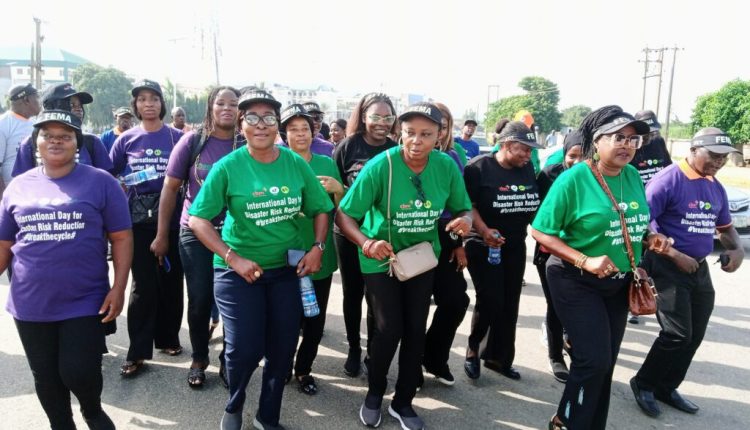
The Federal Capital Territory Emergency Management Agency (FEMA) has called on all stakeholders to work together to fight inequality in disaster risk reduction for a resilient future.
The acting Director General, FEMA, Alhaji Muhammad Sabo, made the call in Abuja on Friday, at an event to commemorate the 2023 International Day for Disaster Risk Reduction (IDDRR).

Oct. 13 of every year has been set aside by the United Nations General Assembly to celebrate how people and communities around the world were reducing their exposure to disasters.
The day was also set aside to raise awareness and mobilise people to take part in building more disaster-resilient communities.
Sabo identified the stakeholders as governmental and non-governmental organisations, local and international bodies, and private individuals.
He said that the theme, “Fighting inequality for a resilient future”, resonates deeply with the challenges being faced in building a safer and more equitable world for all.
According to him, inequality and disaster risk are indivisible, adding that disasters, whether natural or human made, do not discriminate.
Sabo said, “They can strike anyone, anywhere, at any time. However, their impacts are not evenly distributed. It is often the most vulnerable and marginalized communities that bear the heaviest burden, exacerbating existing inequalities.
“As we address disaster risk reduction, we must acknowledge and confront these disparities and to create a resilient future, we must fight inequalities on multiple fronts.
“For example, people who live in poverty are more likely to live in areas that are at risk from hazards.
“They are also less likely to have access to early warning systems and other resources that can help them to stay safe.”
He stressed the need to invest in building resilience at the community level and ensuring that vulnerable populations have access to the resources, knowledge, and infrastructure needed to withstand and recover from disasters.
This, according to him, means better access to health care, education, clean water, and housing.
Sabo said the 2023 IDDRR presented an opportunity to raise awareness of the link between inequalities and disaster risk and take action to reduce inequalities towards building a more resilient future for all.
The director general also stressed the need to listen to the voices of people at more risk to disasters, saying, “they have the knowledge and experience that we need to develop effective solutions.”
Sabo also called for the recognition of gender equality in disaster risk reduction, adding that women and girls suffer disproportionately during disasters.
According to him, their voices and leadership are vital in crafting effective solutions.
“We should promote policies and practices that aim to reduce inequality in access to economic opportunities, social services, and participation in decision making.
“It is also essential to acknowledge that environmental degradation and climate change exacerbate disaster risks.
“To address this, we must work collectively to reduce carbon emissions and transmission to more sustainable practices that benefit everyone, rather than just a select few.
“Fighting inequality for a resilient future serves as a powerful reminder that disaster risk reduction is not merely a technical challenge but a moral imperative.
“Let us commit ourselves to work together, leaving no one behind. And build a more resilient and equitable future for generations to come, ” Sabo said.
Also, Dr Abbas Idriss, Managing Director and Chief Executive Officer, Aygee and Hazard Consulting Ltd, stressed the need to fight all forms of inequality in disaster management.
Idriss, who was the immediate past director general of the agency, also called for collective action to curb human induced disasters, while mitigating the effect of natural disasters.
The permanent Secretary, FCTA, Mr Adesola Olusade, said that breaking the circle of inequality required organised and strategic actions on the part of the government through empowerment programmes targeted at women, girls and youths.
This, according to him, will ensure inclusion so that those with special needs are not also left out.
Earlier, Mrs Florence Wenegieme, Director, Forecasting, Response and Mitigation, FEMA, said that in the last 10 days had been sensitising residents on disaster risk reduction.
“We went round the six Area Councils to sensitise residents of the FCT and we are rounding up today with all stakeholders who play key roles in disaster risk reduction in the nation’s capital.
“We were on radio and television stations for life programmes as well as social media, sensitising residents of FCT on disaster risk reduction,” she said.
The News Agency of Nigeria (NAN) reports that the commemoration of the IDDRR began with a road walk from the FCTA Secretariat to the Conference Hall of the Federal Capital Development Authority (FCDA) at Area 11.
Wenegieme had explained that the essence was to reach out to more residents of FCT with disaster risk reduction messages, particularly what disasters are and how to prevent them.
(NAN)


